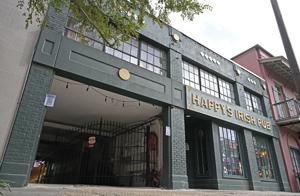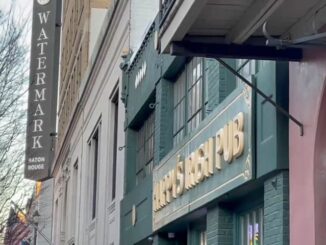
The manager of one of downtown Baton Rouge’s most popular bars is not guilty of violating the city’s noise ordinance because the law is too vague and needs to be addressed by the Metro Council, a city judge ruled Thursday.
Happy’s Irish Pub general manager Perry Stepter was on trial for two misdemeanor counts of violating the noise ordinance on Nov. 11 as part of a monthlong effort by city-parish officials to enforce the rules. The bar’s neighbors lodged numerous complaints last year.
Baton Rouge City Court Judge Judy Moore Vendetto’s ruling, in which she called the ordinance “very subjective,” marked the second time that Happy’s or its employees were found innocent because of the ordinance’s vagueness.
“It’s time that this ordinance is made a lot more specific,” Moore Vendetto said. “I urge our council to … come up with something that is going to appease everybody so we can all live downtown in harmony.”
The judge’s ruling ended a two-and-a-half hour trial that Parish Attorney Andy Dotson, his staff and Metro Councilwoman Denise Amoroso attended.
Amoroso said she was frustrated with the judge’s ruling but would take the lead on overhauling the noise ordinance.
“I’ll do whatever I have to do to protect the citizens’ rights,” Amoroso said. “They have a right to peace and quiet in their own homes. They shouldn’t have to put up with yelling and screaming and music.”
Music and chatter “offensive to persons of ordinary sensibilities” is outlawed in Baton Rouge, and violators can be fined $500 or jailed for up to 30 days. But the ordinance doesn’t stipulate any specific line that needs to be crossed in order for the law to be broken, such as a decibel reading, argued Baton Rouge Attorney Joe Long, who was representing Stepter.
A rework of the noise ordinance has long been discussed by members of the Metro Council, without any formal action.
Amoroso was the last council member to attempt an overhaul of the noise ordinance last spring. That effort failed in the face of pushback from her fellow council members and assurances from East Baton Rouge Parish Alcoholic Beverage Control Office officials that they would begin more aggressively enforcing the ordinance.
Happy’s became the test case of that theory in November when the Alcoholic Beverage Control Board announced it would hear charges that Happy’s had repeatedly violated the noise ordinance throughout the latter half of 2022.
Mark and Deborah Hudson, a couple who own a house on Convention Street backing up to Happy’s, have lodged dozens of complaints with the Baton Rouge Police Department against the bar. The Hudsons say the bar’s live bands that frequently play on the outdoor patio on weekend evenings prevent them from watching television and sleeping in their house until the music stops.
The bar also neighbors the Watermark Hotel on 3rd Street, which has received more than 100 complaints from guests about noise from Happy’s since the beginning of 2022, General Manager David Johnson said.
The ABC board found no fault by Happy’s during the November hearing. Board members also said at the time that the noise ordinance needed to be updated by the Metro Council in order for the board to enforce it.
The ABC hearing covered complaints from multiple days last summer. Thursday’s trial and testimony was limited only to the two offenses that occurred Nov. 11.
Long accused the city-parish of “forum shopping” by first taking the case to ABC before proceeding to City Court after not receiving its preferred outcome.
Montanna Mercer, director of operations at Happy’s, also urged the Metro Council to take action after the hearing, saying it would help to end the ongoing friction between the bar and its neighbors.
“That’s what we want too — something we can read and know what is expected of us,” Mercer said.
In a different hearing Thursday, the parish ABC board approved a harsher fee schedule for liquor license violations, increasing the minimum recommended fee for everything from minor offenses to major ones like allowing underage drinking. The board does not have to follow the fee schedule, but it does set expectations and serves as a deterrence for bad actors, board members said.
The board still has the option to impose harsher penalties, ranging from fines to a revocation of a business’ liquor license.


Leave a Reply